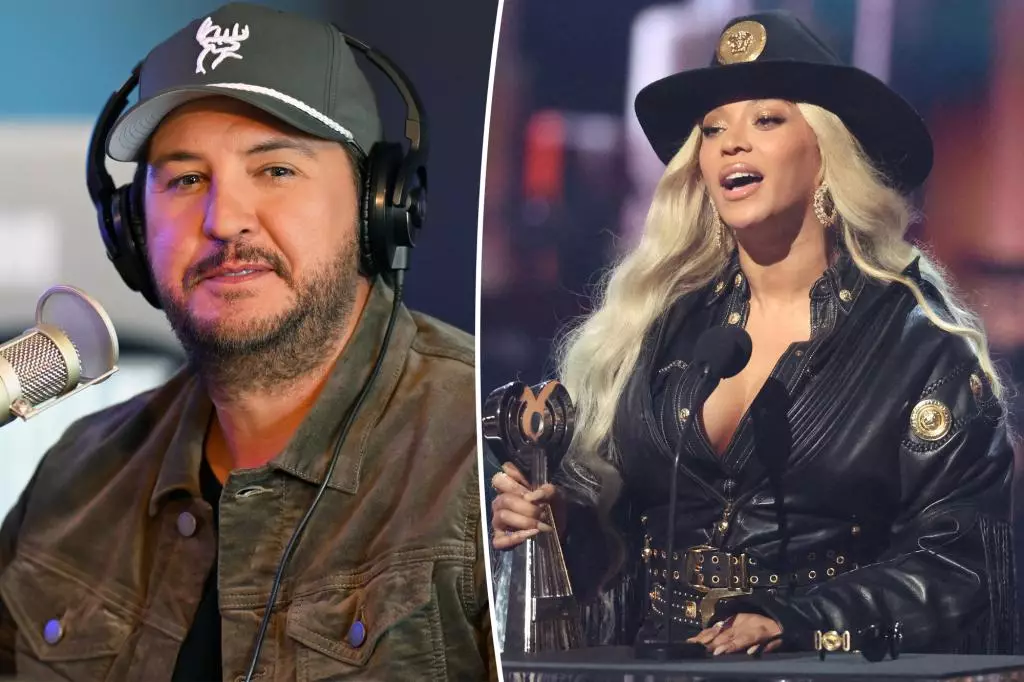The recent discourse surrounding Beyoncé’s debut country album, “Cowboy Carter,” and its omission from the Country Music Association (CMA) Awards nominations has ignited a significant conversation about genre boundaries and acceptance within the music industry. Notably, Luke Bryan, a well-known figure in country music, recently shared his thoughts on this matter during an interview. His comments illustrate the tension that exists at the intersection of mainstream and traditional genres.
Beyoncé’s venture into country music was met with enthusiasm from many fans and artists alike, marking a significant moment of crossover appeal. While she topped the charts with “Cowboy Carter,” Bryan’s remarks suggest a sense of ambivalence within the country music community about her full acceptance as one of its own. He stated, “If you’re gonna make country albums, come into our world and be country with us a little bit.” This perspective reflects a prevailing notion in certain circles of country music that simply releasing a country album is not sufficient for entry into the genre’s inner sanctum.
This sentiment raises questions about what it means to truly belong to a genre. In an industry marked by tradition and a strong community ethos, a requirement to not only produce music within a genre but to actively participate in its cultural landscape seems to be a prerequisite for acceptance.
Bryan further contextualized his comments by touching on the concept of “family” in country music. The genre has long been celebrated for its sense of community, and newcomers are often expected to assimilate into this culture. This idea extends beyond simply making music—it envelops attending events, engaging with fellow artists, and contributing to the rich tapestry that defines country music. As Bryan pointed out, “country music’s a lot about family.” This reiteration hints at an unspoken rule that influences not only how artists are perceived but also how they navigate their careers within the genre.
The Response of Industry Peers
Beyoncé’s situation has elicited responses from other prominent artists, including Dolly Parton and Kelly Clarkson. Parton defended the CMA’s decision, emphasizing that the organization must prioritize artists who have long dedicated their lives to country music. Her comments indicate an understanding that while Beyoncé’s efforts are commendable, there are artists who embody the genre on a more traditional level, thereby complicating the nominations process.
In contrast, Clarkson empathized with Beyoncé’s struggles, recounting her own challenges when crossing over from pop to country. Clarkson’s experience underscores the notion that breaking into established genres can be fraught with barriers, and the music industry often imposes rigid expectations based on an artist’s original genre.
Challenges of Genre Fluidity
Beyoncé herself has addressed the challenges of genre fluidity in her artistic journey. When discussing the motivations behind “Cowboy Carter,” she reflected on past experiences of not feeling welcomed and the evolution of her understanding of country music’s history. This acknowledgment signals a struggle that transcends mere musical style—a battle for recognition and acceptance as an artist who does not conform to traditional expectations.
The comments made by Bryan and others reflect an industry grappling with the implications of genre evolution, particularly as artists like Beyoncé blend musical styles to create something new. The resistance to embracing these changes illustrates broader discussions about artistry, authenticity, and the gatekeeping that often occurs within musical communities.
The ongoing discussions about Beyoncé’s place within country music encapsulate larger themes of inclusivity, identity, and the nature of artistic expression. As the music industry continues to navigate the tensions between traditional boundaries and evolving genres, it becomes paramount to reconsider what it means to belong to a particular musical family. The interplay of community expectations and individual ambitions is likely to shape the narrative of country music’s future, ultimately determining how artists like Beyoncé are received in the ever-changing landscape of music. The perspectives shared by figures within the industry will play a crucial role in fostering a more inclusive understanding of what country music can be, paving the way for future artists who dare to challenge genre norms.

